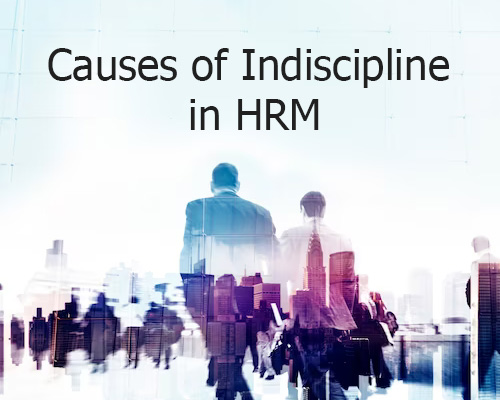8 Causes of Indiscipline in Human Resource Management (HRM): Human Resource Management (HRM) is part and parcel of organizational success as it ensures that the workforce subscribes to what a firm deems necessary to accomplish its goals and values. Despite the fact, indiscipline in HRM can hamper the success of any such efforts and causes a spectrum og different issues that directly affect an organization’s general wellbeing. This article will explore the causes for indiscipline in HRM, discussing various conditions responsible for this phenomenon.

Also See: Relationship Between TQM and HRM
8 Causes of Indiscipline in HRM
Lack of Clear Communication:
One of the primary causes of indiscipline in HRM is the absence of clear and effective communication. When employees are not well-informed about company policies, expectations, or changes in procedures, misunderstandings can arise. This lack of clarity can lead to confusion, frustration, and eventually, indiscipline. HRM needs to establish transparent channels of communication to disseminate information effectively, fostering an environment where employees are well-aware of what is expected of them.
Inadequate Leadership:
Effective leadership is crucial for maintaining discipline within an organization. When HR managers or leaders lack the necessary leadership skills, it can result in a lack of direction, inconsistency in decision-making, and a general sense of disarray. Employees may perceive a weak leadership structure as an opportunity to bend or break the rules without consequences. A strong and capable HR leadership team is essential to set a positive example and maintain order within the workforce.
Also See: 5p Model Of Hrm: Meaning, Purpose With Diagram
Ambiguous Policies and Procedures:
Unclear or ambiguous HR policies and procedures contribute significantly to indiscipline. When employees are unsure about the consequences of their actions or the guidelines they should follow, it creates a breeding ground for misconduct. HRM should regularly review and update policies, ensuring that they are easily understandable and reflect the current organizational needs. Moreover, HR must take steps to educate employees about these policies, leaving no room for confusion.
Inconsistent Enforcement of Rules:
Inconsistency in enforcing rules and policies can erode the credibility of HRM. If employees observe that certain individuals receive preferential treatment or that rules are applied selectively, it can breed resentment and a sense of injustice. HR must ensure a fair and consistent approach to discipline, addressing violations promptly and impartially. This helps build trust among employees and reinforces the importance of adhering to organizational guidelines.
Poor Conflict Resolution:
HRM plays a crucial role in mediating and resolving conflicts within the organization. When conflicts are not addressed promptly or are handled poorly, they can escalate, leading to indiscipline. Effective conflict resolution involves active listening, fair judgment, and providing solutions that address the root causes of the conflict. Failure in this regard can result in a toxic work environment, hindering employee morale and discipline.
Also See: How has HRM become One of the Highly Focused Jobs?
Inadequate Employee Engagement:
Employee engagement is vital for maintaining a disciplined and motivated workforce. When employees feel disengaged or undervalued, they are more likely to exhibit indiscipline. HRM should focus on creating a positive work culture, fostering open communication, recognizing employee contributions, and providing opportunities for professional development. Engaged employees are more likely to align with the organization’s goals and adhere to its policies.
Lack of Training and Development:
Insufficient training and development programs can lead to a lack of skills and knowledge among employees. When employees are not adequately equipped to perform their roles, they may make mistakes or exhibit indiscipline unintentionally. HRM should invest in continuous training programs to keep employees updated on industry trends, technology, and best practices, reducing the likelihood of disciplinary issues stemming from ignorance or incompetence.
Also See: What are the factors responsible for the growth of HRM
Unfair Compensation and Recognition:
Compensation and recognition are powerful motivators for employees. When individuals perceive unfairness in these areas, it can lead to frustration and a decline in discipline. HRM should regularly evaluate compensation structures, ensuring they are competitive and aligned with industry standards. Additionally, recognizing and rewarding employee efforts fosters a positive work environment, reducing the likelihood of indiscipline.
Conclusion:
Indiscipline in HRM can have far-reaching consequences, affecting the overall health and success of an organization. By addressing the root causes, such as poor communication, inadequate leadership, and inconsistent enforcement of rules, HRM can create a positive work environment where discipline is valued and upheld. It is crucial for HR professionals to continually assess and improve their practices, ensuring that they contribute to a workplace culture that fosters productivity, collaboration, and overall success.